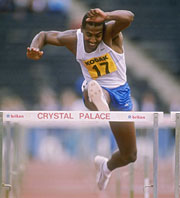The Toughest Olympic Hurdle
Desiree Cooper
MAY 10, 2008
- Renaldo Nehemiah competes in 1987
- (Bob Martin/Allsport/Getty Images)
- View the Slideshow
This weekend, America's best young wrestlers are in Waterloo, Iowa, competing in qualifying events for the Olympic Trials. This is happening across the country, as athletes in various sports shoot for a spot on the U.S. team headed to the Beijing Olympic Games. As the games approach, though, some human rights activists are calling on the United States to boycott. Taking that step would change these athletes' lives forever.
- Renaldo Nehemiah breaks the world record
- (1981aLaN)
Related Stories
More From Desiree Cooper
When America boycotted the Moscow Olympics in 1980, the best hurdler in the world was young American named Renaldo Nehemiah. He was going to be an Olympic champion for sure. Weekend America's Desiree Cooper spoke with Nehemiah recently about the one hurdle he couldn't get over.
Desiree Cooper: So I want to take you back to 1980 -- you're training for the Olympics, and then all of the sudden you hear you're not going.
Audio -- Speech by President Carter: "I have given notice that the United States will not attend the Moscow Olympics unless the Soviet invasion forces are withdrawn from Afghanistan before February 20th. That deadline is tomorrow, and it will not be changed."
Cooper: What was that moment like for you?
Renaldo Nehemiah: Well, when the definitive word came down from President Carter that we weren't going, it was one of devastation. I was 21 years of age, just scratching the surface of my athletic career, and my perspective is that I was still young enough to have other opportunities at other Olympic Games. Although I also had enough awareness and insight to know that there would be retaliation, which there was. In 1984, we were the host country in Los Angeles, and various countries boycotted our games. We didn't have the world's finest athletes in what was deemed an American Olympic Games.
Did you participate in the '84 Games, in Los Angeles?
I did not participate in the '84 Games, and prior to that, I struggled for about a year-and-a-half after the boycott trying to make sense of it -- trying to understand it, trying to put it in perspective of what it could mean to me. I wasn't willing, at that time, to spend four more additional years training for what I knew was on the horizon.
I understand that people will occasionally introduce you as an Olympic gold medalist. How do you respond to that?
For a while there, it was very painful. For about 15 to 18 years, I would just let it go and not say anything. It struck a chord in me in which I didn't like, but I didn't want to embarrass the person in front of me who may not have had all their facts right. Obviously, they didn't. Probably in the last seven to eight years, I'm far more comfortable with letting anyone know -- politely -- that for the record, I didn't.
What happened in the last seven to eight years that made you be able to come to grips with that?
What has happened is that you find out what most people think about you when they no longer have to cheer for you, and I have had the good fortune to have so many positives to be said about me, compliments bestowed on me, many years removed from the sport. I think I performed at the best time that one could have ever performed during the amateur era, because I did it for the love of the sport. I didn't do it for any monetary gain, because there wasn't any, and I'm gratified in knowing that I didn't have to win an Olympic medal to feel this proud and this satisfied with all that I did without going to the Olympic Games.
You're now a sports agent. How did not going to the Olympics -- how is that affecting how you deal with your clients?
Even if we had gone to Olympic Games, anything could have happened on that day. I could have clipped a hurdle, got out of the blocks awkwardly. In 2004, the Athens Olympics, a client of mine -- still today -- Perdita Felicien, was coming out of college, University of Illinois. She was the favorite to win the gold medal in Athens, and the gun goes off, and she hits the first hurdle and falls. I had, I called it, a "coming to Jesus" talk with her. I just looked her right in the eye, and I told her my experience in 1980, and that I would be disappointed if [she was] to let this failure in one race wash away so much of what she had accomplished. It's not about one race.
Well, thanks again for spending your time with us this weekend.
I really appreciate it, Desiree. Thank you so much.







Comments
Comment | Refresh
Post a Comment: Please be civil, brief and relevant.
Email addresses are never displayed, but they are required to confirm your comments. All comments are moderated. Weekend America reserves the right to edit any comments on this site and to read them on the air if they are extra-interesting. Please read the Comment Guidelines before posting.
You must be 13 or over to submit information to American Public Media. The information entered into this form will not be used to send unsolicited email and will not be sold to a third party. For more information see Terms and Conditions and Privacy Policy.